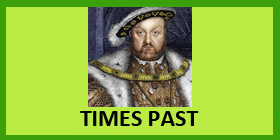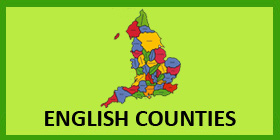




Back to the Mainly The Normans calendar



Stephen duly died and Henry was now crowned Henry II, King of England. However, following the death of his father Geofrrey,
he was also ruler of Normandy and Anjou, two regions in France. As we said in the last part, in 1152 he married Eleanor of Aquitaine who was the ruler of another
large part of France. Eleanor was about 30 at the time, while Henry was only 19. What is more Eleanor had been married to Louis VI, the King of France. Their
marriage was annulled, which means cancelled, by the Pope because Louis and Eleanor were third cousins and shouldn’t have married. Once she left Louis she
summoned Henry to her court and told him they should marry. They did just 8 weeks after the annulment was granted. People did strange things at this time
because Eleanor was actually more closely related to Henry, being his second cousin. However the wedding happened and when Henry became King of England, he
and Eleanor were rulers of all of England and well over half of France. They were very powerful people. Over the next 13 years Henry and Eleanor had 8 children,
five sons and three daughters.
 By 1166, Henry had aquired Brittany too. Although Henry II was
actually the grandson of William the Conqueror, a Norman, because his father was Geoffrey the Plantagenet, Henry has always been known as the first Plantagenet
King of England. To date, and for the foreseeable future, Stephen has been the only ruler of England to have that name and because of the civil war with Matilda,
which historians call “The Anarchy”, he never really had full control. By the way, “anarchy” means a state of disorder due to the lack of authority or government.
By 1166, Henry had aquired Brittany too. Although Henry II was
actually the grandson of William the Conqueror, a Norman, because his father was Geoffrey the Plantagenet, Henry has always been known as the first Plantagenet
King of England. To date, and for the foreseeable future, Stephen has been the only ruler of England to have that name and because of the civil war with Matilda,
which historians call “The Anarchy”, he never really had full control. By the way, “anarchy” means a state of disorder due to the lack of authority or government.
Henry’s first task in England was to create some sort of order following all the fighting. You have to remember that although we keep talking about
Stephen fighting Matilda or Stephen fighting Henry, the actual fighting was done by ordinary people from small towns and villages. While these men were away they
couldn’t work in the fields, plant crops, harvest grain and so food supplies suffered. In order to just keep their family alive, women had to work much harder too.
Henry took over a country with no one really in charge and many laws being ignored and taxes not being collected. Henry set out to control the wealthy
barons and restore law and order. Henry had help from a man called Thomas Becket who was appointed to be his chancellor, the man who looked after the money. Henry
established courts to deal with criminals and set up prisons for those awaiting trials. These trials were held in courts of assize, known as the assizes, and were
held in the main towns of an area with a visiting judge, often from London. Verdicts were returned by locally picked juries of 12, a system we still use today.
Henry was described by a writer from that time as follows. “His height is medium, so that neither does he appear great among the small, nor yet does
he seem small among the great……...his eyes are full, guileless, and dove-like when he is at peace, gleaming like fire when his temper is aroused, and in bursts of
passion they flash like lightning. As to his hair he is in no danger of baldness, but his head has been closely shaved. He also said that Henry had curved legs,
from spending so much time riding in the saddle, and that he never sat unless on a horse.
 The hair he did have was red and people often associate this with
a fiery temper. I have to disagree as I have 3 sons with red/ginger hair and they don’t all have a fiery temper. That's them on the right and from left to right,
Dave, James and Sam. I don’t think hair colour has any effect on your temper. The King was very intelligent and, don’t say anything, I don’t think that has anything
to do with hair colour either. He also didn’t care for magnificent clothing and had a harsh voice.
The hair he did have was red and people often associate this with
a fiery temper. I have to disagree as I have 3 sons with red/ginger hair and they don’t all have a fiery temper. That's them on the right and from left to right,
Dave, James and Sam. I don’t think hair colour has any effect on your temper. The King was very intelligent and, don’t say anything, I don’t think that has anything
to do with hair colour either. He also didn’t care for magnificent clothing and had a harsh voice.
Forward to 1170AD

